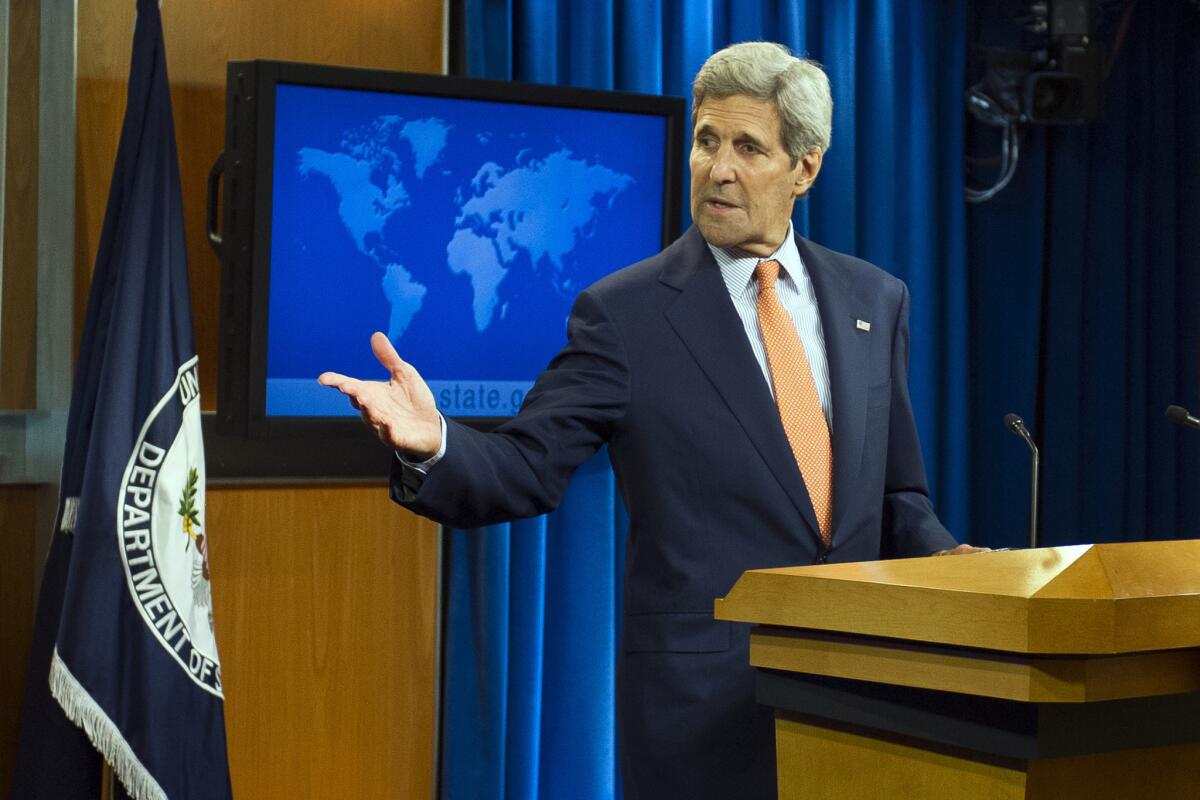Kerry’s challenge as Iran talks resume: Avoid sharp turns

Secretary of State John F. Kerry asks for his crutches after speaking to reporters at the State Dept. in Washington.
reporting from VIENNA — Secretary of State John F. Kerry and his team are returning to international negotiations at a 19th century palace this weekend with a bounty of unsolicited advice on how they can wring a better nuclear agreement from Iran.
With negotiations facing a Tuesday deadline, lawmakers, former officials and other critics and allies have in recent days been issuing statements and reports to try to keep the bargaining from taking an unfortunate turn after almost two years of work.
The critiques could work to the administration’s advantage if they convince Iran that the U.S. diplomats are under powerful domestic pressure to stick to tough terms. Iranian officials in Tehran have similarly been demanding tough terms, perhaps in hopes of giving their negotiators added bargaining leverage.
But if the kibbitzers set public expectations beyond what is achieved, the deal could emerge looking damaged, and might be rejected by the public. Some of the commenters, who fear the deal will pave the way for an Iranian bomb, say they wouldn’t mind such an outcome.
Some U.S. critics have set terms that are “almost impossible to meet,” said Ilan Goldenberg, a former Obama administration official who is now with the Center for a New American Security think tank.
The U.S. negotiators and those of five other world powers are seeking a deal that would lift economic sanctions on Iran if it accepts limitations on its nuclear program to prevent it from obtaining a nuclear bomb.
Sen. Bob Corker (R-Tenn.), chairman of the Senate Foreign Relations Committee, has cooperated with the administration on Iran in the past, but has recently sounded more critical. He said last week that Kerry seemed to be “letting this deal erode away.”
Corker said the deal must allow inspectors to gain access to Iranian military bases, and must allow “anytime, anywhere” inspections.
The administration and the other world powers at the negotiating table agree with Corker that access to military bases is essential to any deal. But they’re not likely to get immediate access to sensitive Iranian sites.
The negotiators are planning to give Iran a number of days time to challenge any request from United Nations inspectors for access to an undeclared nuclear site.
On Wednesday, a group of respected former officials laid out in a letter their requirements for a nuclear deal. Their prescription was noteworthy because the group included former members of the administration’s first-term inner circle on Iran -- Gary Samore, President Obama’s former adviser on weapons of mass destruction; Robert Einhorn, former State Department nonproliferation chief; and Dennis Ross, former top administration advisor on the Middle East.
The group’s negotiating advice tracked pretty closely with what the administration has been demanding. The former officials warned that they might not be able to support the deal if the administration caved at the last minute on key demands.
Interestingly, the group’s strongest criticism of the administration was over President Obama’s reluctance to do more with the U.S. military to halt the moves of Iranian forces and their armed proxies in the Middle East. The former officials said that to meet Iran’s threat fully, the administration needed to do more to train allied forces in Syria and Iraq, set up a safe haven in Syria, and stiffen resistance to Iranian arms shipment and harassment of commercial shipping in regional waters.
The American Israel Public Affairs Committee, the leading pro-Israel lobby, has laid out five requirements for a good deal. The agreement must authorize aggressive inspections; answer all questions about past nuclear research; lift sanctions only after Iran complies with obligations to scale back its program; restrain the nuclear program for “decades”; and dismantle Iran’s nuclear infrastructure, the group says.
The deal is sure to fall short of several of those goals. The six countries aren’t demanding dismantlement of excess Iranian centrifuges, for example; they’ll be put in storage and monitored.
The six powers have given up hope of getting Iran to answer all the questions about its past nuclear research. Such a probe could take years, and still not answer all of the U.N.’s questions about past nuclear work.
Iran would lose a lot if it acknowledged past research on nuclear devices, because that would puncture its claim that it has never sought the bomb.
So instead, the negotiators are bargaining over a specific list of steps Iran will be required to take, to try to answer some of the most important questions about past bomb research. Once Iran has completed those actions, the world powers will be willing to start lifting sanctions.
More to Read
Sign up for Essential California
The most important California stories and recommendations in your inbox every morning.
You may occasionally receive promotional content from the Los Angeles Times.











